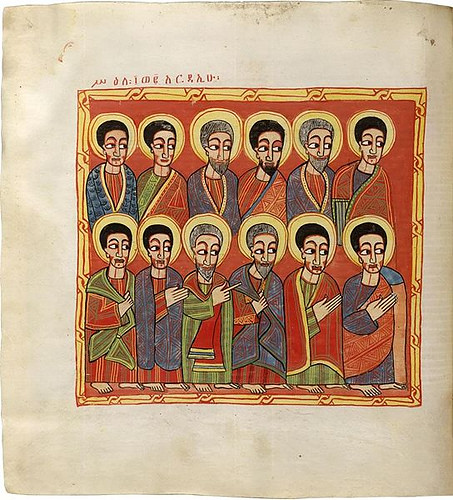Imperfect on Earth... Glorious in Heaven
Feast of Sts. Peter & Paul, Apostles
Today’s Readings: [Click here]
Last week, we celebrated the mass of the 12th Sunday in Ordinary Time. Next week, we celebrate the 14th. But today, we skip the 13th Sunday—not because it’s considered unlucky; the Church doesn’t suffer from triskaidekaphobia—the superstitious fear of the number thirteen! But rather because a solemnity of higher rank has come up on the Church calendar: the Feast of Saints Peter and Paul, the Apostles.
Not only is it unusual to replace a regular Sunday with a feast day, but it’s also highly unusual for two major saints to share the same feast day. Wouldn’t you think that Peter, the major apostle to the Jews, and Paul, the major apostle to the gentiles—would each merit their own day? I once heard an archbishop say that the shared feast day is a bit of humor on God’s part: since the two of them couldn’t get along here on earth, God put them together in heaven.
Maybe there’s some truth in that little joke. In his letter to the Galatians, Paul talks about the clash he and Peter had over the issue of whether gentile converts had to become Jews and be circumcised before they could be Christians. Paul wrote, “When Peter came to Antioch, I opposed him to his face, because he was clearly in the wrong” (Gal 2:11). But despite that disagreement, Paul made it very clear that he held Peter in high regard.
It actually gives me a lot of hope, and peace of mind, to hear that two great saints like Peter and Paul could be at serious odds with each other. And they weren’t the only ones! Saint Bonaventure fought with Saint Thomas Aquinas… Saint Jerome battled with Saint Augustine… and there were many others, too.
It reminds us that even the greatest saints are human and had human weaknesses and shortcomings. So I guess we shouldn’t be surprised when family members or close friends battle from time to time—sometimes even vehemently. We’re in good company!
And what’s more, that doesn’t necessarily put us in God’s doghouse. Everybody knows that Jesus singled Peter out and entrusted him with enormous responsibility. The Lord said, “You are Peter and upon this rock I will build my church” (Mt 16:18). He also said, “I will give you the keys to the kingdom of heaven” (Mt 16:19). Peter didn’t come by this honor on the basis of merit. Quite the opposite! Like Adam, Moses, Elijah and many others, Peter tried to duck responsibility and had many other character flaws… but Jesus came back, “Feed my sheep” (Jn 21:16).
Think about that! God chose Peter, an ordinary human being with many faults, to be his vicar on earth. He also picked Paul, with just as many imperfections, to be his number one missionary to non-Jewish world. With the Lord’s help, both of them rose above themselves and distinguished themselves in Christ’s service. And likewise, despite our own failings, we are called to do exactly the same—to let the Lord shape us, mold us, use us as his instrument of love and his witness to the kingdom.
There was a woman whose happiness was shattered when her very beloved brother died unexpectedly. In her anguish, she kept asking God, “Why?” But hearing only silence, she set out in search of an answer.
She hadn’t gone far when she came upon an old man sitting on a bench. He was weeping. He said, “I have suffered a great loss. I am a painter, and I have lost my eyesight.” He, too, was seeking an answer to the question, “Why?” So the woman invited him to join her, and taking him by the arm, they trudged down the road.
Soon, they ran into a young man who was despondent and walking aimlessly. He had lost his wife, the source of his joy, to another man. He joined in the search of an answer to the “Why?” question. Shortly, they came upon a young woman sitting on her front doorstep and crying. She had lost her child. She also joined them. Nowhere could they find an answer.
All of a sudden, they came upon Jesus Christ. Each confronted the Lord with their questions, but Jesus gave no answer. Instead, he began to cry and said, “I am bearing the burden of a woman who has lost her brother, a girl whose baby has died, a painter who has lost his eyesight, and a young man who has lost the love of his life.” As he spoke, the four moved closer, and they embraced each other. And they grasped Jesus’ hands.
Then Jesus spoke again. “My dominion is the dominion of the heart. I can’t prevent pain. All I can do is heal it.”
“How?” asked the woman.
“By sharing it,” he said. And then he was gone.
And the four? They were left standing, holding each other.
Peter and Paul fought. They struggled. They endured many difficult trials in life. Yes, we honor Peter because he was the first pope. We honor Paul because he set the standard for countless missionaries. But far more importantly, we honor them for their loving witness to Christ. They loved much, and they accepted and clung to each other despite their sometimes-great differences. What a glorious definition of what it means to be a saint. And what a glorious honor to celebrate their sainthood jointly!
Saints Peter and Paul, pray for us—that we may be made worthy of the promises of Christ.





